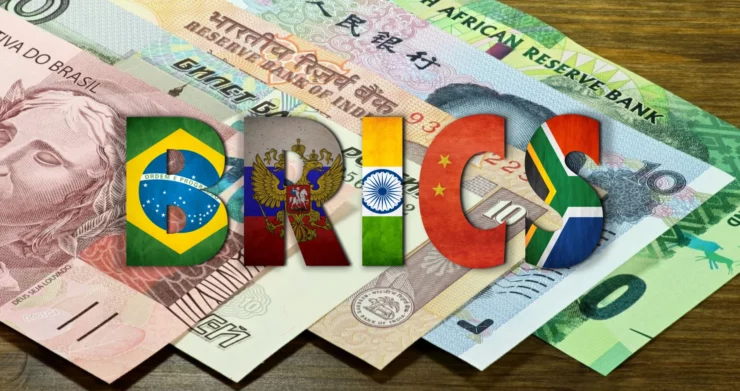
In the annals of financial history, few narratives are as captivating as the ascent of the United States Dollar. Since the seminal Bretton Woods Agreement of 1944, the greenback has wielded unparalleled influence, staking its claim as the world’s de facto currency. Anchored to the universally accepted Gold Standard and complemented by the establishment of international financial institutions like the IMF and the IBRD (now the World Bank), both generously funded in dollars for the development of emerging nations, the USD embarked on an unparalleled journey. Concurrently, co-operation between the United States and oil-rich Middle Eastern nations in the realm of petroleum trade further strengthened the dollar by tying it to the power of oil.
For decades, it appeared as if the dollar’s dominion over the global economy was impervious to challenge. With virtually all international trade, foreign exchange, and financial investments denominated in USD, it seemed there were no credible contenders on the horizon. The United States stood tall as an economic and industrial titan, firmly ensconced in its preeminent position.
However, the wheels of history turn, often in unexpected ways. The emergence of China as an economic colossus in the 21st century has sent shockwaves reverberating across the globe. The United States, responding to this potent challenge, has meticulously crafted economic and foreign policy strategies. These include economic decoupling and, more assertively, the deployment of military forces and aid to contested territories such as the South China Sea and Taiwan. Yet, these efforts have proven insufficient to deter China’s inexorable ascent. Interestingly enough, most of China’s economic issues have been due to domestic reasons – such as its strict containment measures during the pandemic.
Intriguingly, the challenge to America’s position is not limited to traditional rivals. India, in the past decade, has witnessed meteoric economic growth, positioning itself as a prime destination for manufacturing investment—a strategic move by the West to mitigate dependency on Chinese production for political insulation. The United States and the Western bloc have traditionally counted on India’s support and cooperation in their endeavours. However, the Russia-Ukraine conflict has upended this dynamic. India’s economic prowess has now granted it the latitude to chart its own course in contentious international affairs. In line with its historical policy of Non-Alignment, India has refrained from taking a strong stance on the conflict and maintained economic ties with Russia despite Western sanctions. Notably, they have agreed to trade in currencies other than the dollar, including the Chinese yuan and the UAE Dirham, although negotiations to trade in rupees and roubles have faltered.
This intriguing development, and the broader geopolitical shifts surrounding it, form the core of our discussion. The United States’ standing as a global hegemon appears less steadfast than it did at the turn of the century. While skeptics might argue that China alone lacks the necessary clout to upend the status quo, the emergence of alliances such as BRICS pose a formidable challenge. Comprising several powerhouse economies, their combined GDP surpasses that of the United States by trillions of dollars. These countries have become increasingly impervious to external pressures, favoring trade relations conducted on their terms.
In a bid to shake the dollar’s dominance, BRICS nations are exploring alternatives. While Brazil has overtly called for the creation of a common currency for intra-BRICS trade, the remaining member states are actively promoting trade in their own national currencies—none of which are the USD. The initiation of trade in the currencies of BRICS nations poses a considerable threat to the dollar’s supremacy. Even without a singular common currency, the proliferation of various currencies for international trade fosters an environment conducive to diversification.
Moreover, BRICS has new members now, including major oil producers like Iran, the UAE, and Saudi Arabia. The induction of these nations would enable BRICS to bolster their future common currency with the power of oil, akin to the Petrodollar. China, in particular, has showcased its adeptness at navigating international tensions by mediating historic negotiations between Iran and Saudi Arabia this year. Additionally, the creation of the New Development Bank by BRICS serves as a counterbalance to institutions like the IMF and the World Bank, which have long represented Western financial dominance and underpinned the dollar’s global preeminence in international development.
In summary, we find ourselves in a time of rapid transformation, defying even the most prescient predictions. The genesis of alternative financial systems by BRICS nations, designed to rival entrenched Western-led institutions, is an epochal development. Yet, the path to a world where these systems emerge as genuine global alternatives remains fraught with challenges. Many BRICS nations grapple with economic difficulties, while the United States has managed to navigate recessionary trends relatively smoothly. Additionally, BRICS is not yet a formal union, rendering it susceptible to internal political divisions. The United States, despite its internal challenges, remains a singular economic entity capable of harnessing its economic might cohesively, while BRICS nations harbor distinct agendas that may not always align. Geopolitical fissures, such as the enduring territorial disputes between China and India, further underscore the complexities of BRICS cooperation.
In this era of shifting paradigms, one thing is certain: the dollar’s unchallenged dominion may be facing its most formidable test yet. Whether BRICS nations and their expanding consortium of allies can successfully mount a credible challenge to the dollar’s reign remains a question that will shape the contours of the global economy in the years to come.
Taut Bataut – is a researcher and writer that publishes on South Asian geopolitics, exclusively for the online magazine “New Eastern Outlook”.